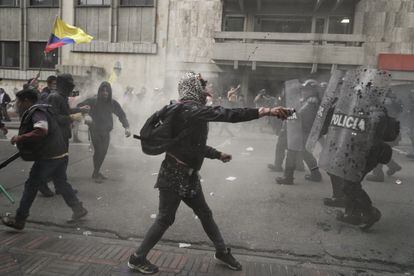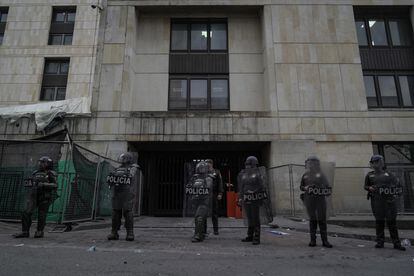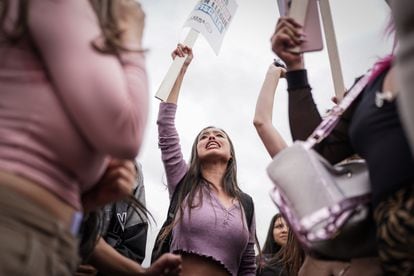”We meet under normal conditions. We advanced the round of voting for the election of the new attorney general of the Nation, we did two rounds and the final result is that none of the candidates obtained the required votes,” the president of the Supreme Court said before the microphones of the expectant journalists. of Justice, Gerson Chaverra. He did so at the Bogotá Palace of Justice around noon this Thursday, a few meters from the place where dozens of protesters were asking for a decision. Four hours later, the tone he used to read an official statement was different. “It is unacceptable that judges are blocked,” he read in front of the cameras. “Democracy is left in suspense when any sector or actor in a country attempts to put political, physical or moral pressure on judicial decisions.”
In those four hours, political tension rose, as an excessive reaction to what was happening in the vicinity of the headquarters of the Colombian high courts. There, in the heart of Bogotá, the protesters blocked the exits of the Palace, preventing the magistrates—and dozens of other workers—from going out to lunch. The vote on the shortlist for prosecutor had already taken place and it was known that it would be resumed in two weeks, but the protesters did not give up their complaints. “Prosecutor out!” said a graffiti against Francisco Barbosa, who ends his term next Monday the 12th.
Inside, the anguish was increasing. Outside, in the networks more than in the streets, tension escalated due to false news that some media outlets picked up, such as that a helicopter had had to evacuate some magistrates, that one of them had been evacuated by a stone while trying to leave the Palace, or that the magistrates were going to say publicly that “the institutional breakdown” was being experienced.
Finally, the tension was reflected in the 4:00 p.m. statement. “The Court defends and guarantees the legitimate right to peaceful protest and the divergence of citizen and institutional positions in the public affairs of the Nation. However, on this occasion, it condemns the violent and illegal blockade,” the text said. “The Supreme Court of Justice requires the National Government to provide the necessary guarantees so that the exercise of the powers of this corporation and the other Colombian judges can be carried out without pressure, harassment or threats.” An hour later, after an explicit order from President Gustavo Petro to the Police to lift the blockade, the uniformed men managed to do so with isolated confrontations with some protesters.
The president, who is the one who has spoken of an “institutional rupture” against him led by the still prosecutor Barbosa, has been very careful not to include the Court in that statement. The magistrates had also avoided any criticism of the Government. The previous Tuesday, Chaverra went to the Casa de Nariño to meet with Petro, in a meeting in which, although the shortlist was not discussed, the two parties sent a message of harmony and understanding with the election on the horizon.
Newsletter
The analysis of current events and the best stories from Colombia, every week in your mailbox
RECEIVE THE

Before and after, however, the court received pressure to elect Barbosa's replacement as soon as possible, from a shortlist of renowned female criminal lawyers that it received from President Petro four months ago. Although it is usual for the Supreme Court to take a while to elect attorneys general, on this occasion a combination of factors has led to calls for speed from different sides.
One is that Barbosa revealed himself to be a loquacious prosecutor and so critical of the president that he has become one of the heads of an opposition without a defined leader. That position, when the Prosecutor's Office has also opened (with substantiation) criminal proceedings against the president's son and brother, has produced a greater urgency to replace the leadership of the entity. “Barbosa has helped Petro show himself as a victim,” summarizes political analyst Hubert Ariza.

Another reason is the shadows that Barbosa's deputy prosecutor, Martha Mancera, has, who will remain in charge of the Prosecutor's Office until the Court chooses. The criminal has been accused of covering up and protecting for several years Francisco Javier Martínez, former director of the CTI of the Prosecutor
's Office in Buenaventura and who has been linked to drug trafficking and arms trafficking organizations. The previous weekend it became clear that she had lied to public opinion by saying that there was no official document in which Martínez's links were reported, or that she was unaware of an issue that she should have known about.
The third reason, a consequence of these two, is that a change in the Prosecutor's Office would be a balm for political tension. Whoever is chosen, a prosecutor who knows the entity, a criminal expert and has no stains on her resume will arrive. Furthermore, without a political career or past experience in any Government, she would contrast with the current situation.
But the events of this Thursday in front of the Palace of Justice do not guarantee that this urgency will translate into a faster process in the Supreme Court which, supported by the rest of the Judicial Branch, remains in its thirteen. “Democracy is left in suspense when any sector or actor in a country attempts to politically, physically or morally put pressure on judicial decisions,” states the statement after the blockades. A magistrate, in reserve, told this newspaper that they were “scared but convinced.”
Given the increase in tension, the Executive has sought to disassociate itself from the blockade, despite the fact that the initial call came from one of its bases, the official teachers' union center, FECODE, and the next day the president wrote on his X account: “I ask the teachers to help us organize the coordination of popular forces.” These statements led to Thursday's demonstrations.

However, it is one thing to call for marches and another to determine what happens in them. Petro himself has reiterated in recent weeks his respect for the Cortes and has said that they do not participate in what he has called a “soft coup” or “institutional rupture.” And, on Thursday, after hours of blockades, it was he who ordered the Police to dismantle the mobilization. His relationship with the Judicial Branch, and the degree of political tension in the country, depended on it.
The president has indicated that the blockades could have been due to people infiltrating the march. “In my Government, infiltrators are not allowed in the marches with political objectives other than those of the protesters. These people sent to blockade the Palace must be thoroughly investigated. The order to the police is to clear the doors respectfully but forcefully. Period,” he wrote in the most critical moments of Thursday on X, in front of a video that showed how a handful of protesters tried to tear down the fences that protected the Palace of Justice, while dozens more sought to stop them.
In my government, infiltrators are not allowed in marches with political objectives other than those of the protesters. These people sent to blockade the palace must be thoroughly investigated.
The order to the police is to clear the doors with respect but with… https://t.co/l3o1rgokTZ
— Gustavo Petro (@petrogustavo) February 8, 2024
The Minister of Justice, Néstor Osuna, personally close to some magistrates and responsible for his position for the relationship between the Executive and the Judicial Branch, has sought to reduce tension. “The Government respects and abides by all the decisions of the Supreme Court of Justice, its times and procedures. It also guarantees and protects the integrity of its judges in all circumstances. I call for calm,” he said in X.
The government respects and abides by all the decisions of the Supreme Court of Justice, its times and procedures. It also guarantees and protects the integrity of its Magistrates in any circumstance. I call for calm. https://t.co/UcSHR7R3Cp
— Néstor Osuna (@osunanestor) February 8, 2024
But not all political actors are on that line. Former president César Gaviria, head of the Liberal Party, reacted by accusing Petro of violating the Constitution, without detailing what events he was referring to. “The President is not behaving like a sane person, we advocate for his mental capacity to govern Colombia,” he stated in a press release. Next week, when Mancera officially occupies the position of attorney general, and on February 22, when the Court plans to vote again on the shortlist, it will be clearer how much echo Minister Osuna's call has.
Subscribe here to the EL PAÍS newsletter about Colombia and here to the channel on WhatsAppand receive all the information keys on current events in the country.
#announcement #prosecutor #charge #poisons #politics